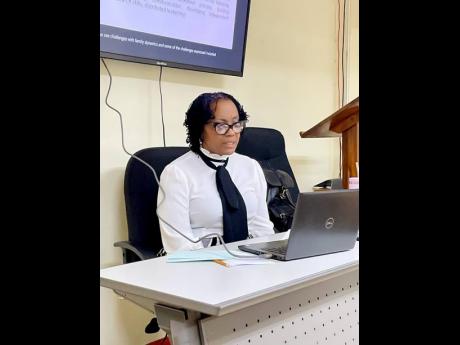Petersfield Primary principal climbs educational ladder to PhD
COMPLETING her Doctor of Philosophy (PhD) in education psychology is the ultimate symbolism of perseverance, hard work and dedication that Dr Susan Rattray-Hammond displayed over the last seven years.
An educator for more than 27 years, Rattray-Hammond has always harboured ambitions of reaching the pinnacle of higher education by pursuing a doctorate.
The 48-year-old first attained a Diploma in Primary Education, focusing on advanced mathematics from Bethlehem Moravian College. In 2003, she graduated from Medgar Evers College in New York with a degree in psychology. Two years later, she pursued a Master of Science in Educational Leadership, through the Sam Sharpe Teachers’ College, with Central Connecticut State University.
“The persons who know me very well know me as a bookworm, and so the questions they ask now is, ‘What’s next?’” Rattray-Hammond shared with The Gleaner.
Last Thursday, she successfully defended her PhD dissertation at the Northern Caribbean University that explored virtual instructional leadership and students learning during the COVID-19 pandemic.
Rattray-Hammond, the principal of Petersfield Primary and Infant School, noted that there were consistent challenges in juggling a full-time job while pursuing a PhD, and noted that she was tested the most when she was almost at the end of her journey.
In 2021, she applied for a year’s leave of study from the Ministry of Education to conduct field work and do an internship, but Rattray-Hammond said that she was denied twice, on the basis of the ministry already reaching its quota and not giving priority to people studying at the PhD level.
Although she felt discouraged, she persisted. And with the support of her school board, she successfully appealed the ministry’s decision.
“Education is at a point where we need qualified people, and for educators, it helps to pass on knowledge if we are more knowledgeable. And knowledge is not static. Learning and information is evolving so rapidly,” she told The Gleaner.
Knowing this, she said, fuelled her desire to complete her programme.
But during the first term of her last year, she was dealt the most drastic blow; her husband of 20 years, and who she said had been very supportive of her aspirations, fell ill and died four months into the term.
“The entire term, September to December, I never had a chance to do much in terms of my studies because I was there with him every day,” she said. “It wasn’t easy.”
After getting her daughter settled in university abroad and ensuring the smooth transfer of her son to a high school, so he could be closer to their home in Savanna-la-Mar in Westmoreland, the now-widowed Rattray-Hammond devoted her time to her studies. With support from her children and the dissertation chair and committee, she sprinted to the finish line.
“This is a dream that I had, that I wanted to achieve long before now,” she said. “I am extremely proud, I am also proud of the research that I did.”
Stating that she is very spiritual, Rattray-Hammond believes her purpose is to serve others. While she has aspired to fulfil this through her role as classroom teacher and head of a school, her goal now is to widen the pool of people she can serve by working as a licensed psychologist.
But her “passion for education will never end”.
She maintains that her role as a psychologist will afford her flexible hours, so she can continue giving back by “ ... educating our nation’s children and educators, too, because that is where I really think I can have the greatest impact now – if I am in a space where I am able to educate educators before they get to the classrooms – because that is where I am seeing the gap now.”
Rattray-Hammond now has a new ambition of seeing more people trained in education psychology, which she insists will be beneficial to the school system.
“We are having serious issues and we need more persons in the field of education psychology, because we need persons who are equipped, who can do the educational assessment, who can do the treatment plans and do the intervention[ and not just help the students, but help the parents,” she said.

